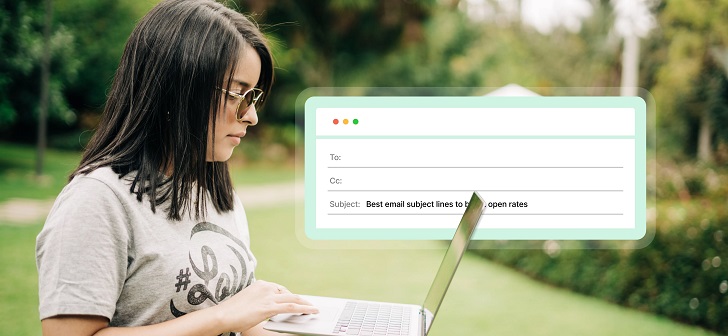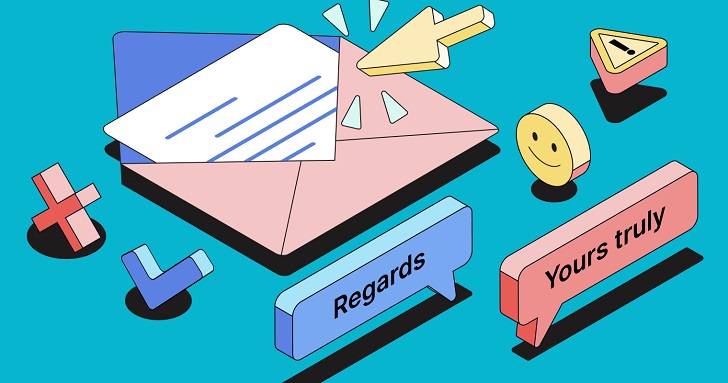
Mastering Email Etiquette for Career Success

In today’s digital age, email has become a crucial communication tool in the workplace. How you communicate through email can significantly impact your professional image and career prospects. Understanding and practicing proper email etiquette is essential for effectively conveying your message, maintaining professional relationships, and boosting your career.
This article will discuss email etiquette tips to help you enhance your professional communication skills and excel in your career.

Mailerlite/ Pinterest | A clear subject line is the first step in writing an effective email
Use a Professional Email Address
When it comes to email etiquette, it starts with the basics. Ensure that you use a professional email address with your name or a variation. Using a personal or inappropriate email address can create a negative impression on recipients and make it difficult for them to take you seriously.
Write Clear and Concise Subject Lines
Subject lines are the first thing recipients see, so make sure they accurately reflect the content of your email. Use clear and concise language to provide a summary of the message. A well-crafted subject line helps recipients prioritize and understand the importance of your email, increasing the chances of prompt response and action.
Use a Professional Tone
Maintain a professional tone in your emails, regardless of the recipient. Use proper grammar, punctuation, and spelling to convey your message clearly and effectively. Avoid using excessive capitalization, slang, or emojis, as they can be perceived as unprofessional. Remember: Emails are formal communication and should reflect your professionalism.

Ramakant/ Getty Images | It’s important to keep it brief and to the point while writing an email
Keep It Brief and to the Point
In today’s fast-paced work environment, people often receive many emails. Consider the recipient’s time by keeping your emails concise and focused. Clearly state your purpose, provide the necessary information, and avoid rambling or including irrelevant details. If your email requires a lengthy discussion or explanation, consider scheduling a meeting or phone call instead.
Use Professional Greetings and Closings
When starting an email, use a professional greeting such as “Dear [Recipient’s Name]” or “Hello [Recipient’s Name].” Avoid using casual or informal greetings, especially when emailing someone you haven’t met or someone in a more senior position. Similarly, end your emails with a professional closing, such as “Best regards” or “Sincerely,” followed by your name. These small details contribute to a polished and professional email.

Karen Hertzberg/ Flickr | When you’re struggling with how to end an email, it’s best to consider the context.
Be Mindful of Tone and Emotion
Emails lack non-verbal cues, such as facial expressions and tone of voice, which can lead to misinterpretation. Be mindful of how your words may come across, and avoid using language that can be perceived as aggressive or confrontational. If you’re discussing a sensitive or challenging topic, consider picking up the phone or scheduling a meeting for a more nuanced conversation.
Proofread Before Sending
Before hitting the send button, take a moment to proofread your email. Check for any grammatical errors, spelling mistakes, or typos. Read your email aloud to ensure the tone and message are clear and concise. A well-crafted and error-free email demonstrates attention to detail and professionalism, helping to build a positive impression.
More in Advisor
-
`
The Push for Tax-Free Tips in America – A Win or a Risk?
Tipping has long been a fundamental part of the American service industry, providing essential income for millions of workers. However, the...
February 20, 2025 -
`
Matthew Perry Foundation Launches Addiction Fellowship at MGH
The impact of addiction on individuals and families is profound, and the need for specialized medical care in this field has...
February 13, 2025 -
`
Celebrity Couples Who Have Ended Their Relationships in 2025
2025 has already seen its fair share of celebrity breakups, and the year is just getting started. From heartfelt announcements to...
February 6, 2025 -
`
How Trump’s Policies Will Reshape Artificial Intelligence in the U.S.
The United States witnessed a significant political shift as Donald Trump took the presidential oath once again. His return to the...
January 31, 2025 -
`
Millie Bobby Brown Shuts Down Age-Shamers with a Powerful Message
From the moment Millie Bobby Brown first appeared as Eleven in “Stranger Things,” she captured hearts worldwide. But growing up in...
January 25, 2025 -
`
Why Outsourcing Payroll Services Is a Smart Business Move
Managing payroll is no small task—it’s a crucial part of any business that ensures employees are paid accurately and on time....
January 15, 2025 -
`
These AI Stocks Should Be on the Watch List of Investors in 2025
The buzz around AI stocks is growing louder than ever. With artificial intelligence shaping industries like healthcare, finance, and tech, smart...
January 8, 2025 -
`
Why the Starbucks Workers Strike Is Expanding Across U.S. Cities
The Starbucks workers’ strike has gained significant momentum, with employees in more U.S. cities joining the movement to address unresolved issues...
January 2, 2025 -
`
Are Shawn Mendes and Camila Cabello Still Close After Breakup?
The connection between Shawn Mendes and Camila Cabello continues to intrigue fans worldwide. Their shared history, from chart-topping collaborations to a...
December 24, 2024















You must be logged in to post a comment Login